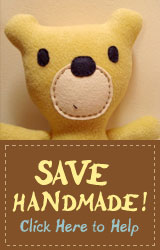A new law will be coming into effect on 10 February, called the Consumer Product Safety Improvement Act (CPSIA). It demands that all products for children aged 12 and younger be tested for lead and phthalates, and that those that haven’t been tested yet are considered hazardous and may not be sold.
It’s about time that lead and phthalates are banned from children’s products – manufactured in the States or imported from abroad – and that the manufacturers have tests to show their safety. But this well-intentioned law suffers from two problems:
- It applies to any and all “consumer product designed or intended primarily for children 12 years of age and youngerâ€: from toys and clothing to books, games, sports equipment, furniture and DVDs.
- It applies not only to products being made right now and after 10 February, but also to products that are already on the shelves. This means it doesn’t just put manufacturers on the spot, but retailers (or resellers) and second-hand sellers, as well.
Consider that
Lead testing promises to be expensive — from several hundred to several thousand dollars per test, depending on the product. And each batch of each item must be tracked and tested, making compliance brutally expensive for items with small runs. (source)
No wonder the law in all its generality is creating a panic. For instance, for a while there it seemed as if many thrift stores and second-hand shops were going to have to close.
But there may now be good news for them. The Consumer Product Safety Commission, which is responsible for enforcing the law, drafted a Memo to clarify the law. “The commission does not have the authority to change the law but can decide how to interpret it” (source).
As for second-hand children’s products – thrift stores, consignment shops, and other used-goods stores:
Sellers of used children’s products, such as thrift stores and consignment stores, are not required to certify that those products meet the new lead limits, phthalates standard or new toy standards. (Memo)
How about the retailers whose entire stock is bound to become contraband? Those that sell clothing and toys made of natural materials such as wool or wood (not painted) may be off the hook, for the Commission is considering giving also them an exemption (source).
All others may have to consult their lawyers. For them too, the CPSC seems to bending the rules a little, in what to me two rather confusing paragraphs:
- The new safety law does not require resellers to test children’s products in inventory for compliance with the lead limit before they are sold. However, resellers cannot sell children’s products that exceed the lead limit and therefore should avoid products that are likely to have lead content, unless they have testing or other information to indicate the products being sold have less than the new limit. Those resellers that do sell products in violation of the new limits could face civil and/or criminal penalties. (Memo; my emphasis)
- While CPSC expects every company to comply fully with the new laws resellers should pay special attention to certain product categories. Among these are recalled children’s products, particularly cribs and play yards etc. (Memo; my emphasis)
Does this mean (“while”) that that only those “certain product categories” should be actually tested?
Can the small shops afford to run these tests on their suspect stock? Many can’t, like Amanda Christina of Hearts and Trees, who will no longer be able to sell her homemade art, handicraft and nature study kits.
And what about children’s books, for instance? From a Boston-based article on this matter:
This Wednesday, Amazon.com sent a general letter informing its vendors that, if they did not certify their products by January 15, the items would be returned at the sellers’ expense…
To make matters worse, even publishers that have already had their products tested for lead will be forced to retest…
“All of us are totally in the dark,†says Terri Schmitz, owner of the Children’s Book Shop in Brookline. “I can’t make a decision, because I don’t know what the regulations are. We’re all sort of in limbo here.†(source)
You may even find the shelves of your childrens’ library empty…
To be continued, no doubt.
Go to Cool Mon Picks SaveHandmade for more information, resources, and a way to respond to this law.

Leave a comment